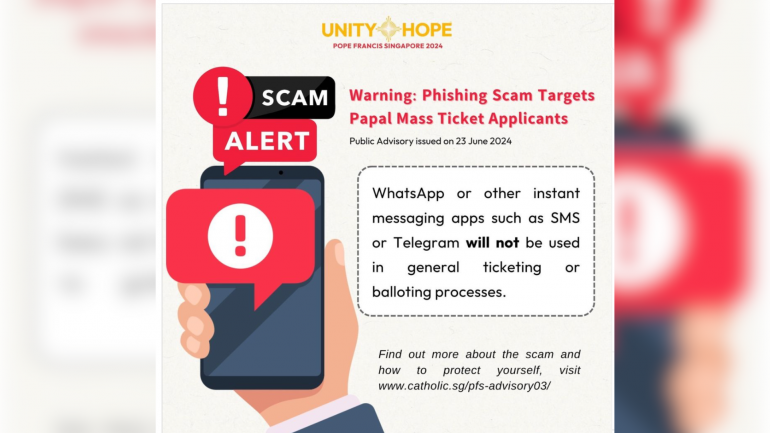Singapore archdiocese warns against phishing scams targeting Papal Visit ticket applicants

The Archdiocese of Singapore has released a statement warning the faithful regarding phishing scams that target ticket registration applicants for the Pope’s Mass on his visit to the country in September.
The Pope Francis Singapore 2024 Organizing Committee has received reports that scammers have taken over some of the applicant's WhatsApp accounts.
“Scammers, having gained access to the WhatsApp accounts of those on your contact list, masquerade as your contacts and ask you to generate and send them a WhatsApp verification code on the pretext of helping you with the Mass ticket registration,” explained the organizing committee.
“They then use this code to hijack your WhatsApp account, gaining access to your contact list to perpetuate the scam.”
The committee made it clear that general ticketing or balloting processes will not use WhatsApp, SMS, Telegram, or other instant messaging apps.
“Registration for the ticket ballot begins June 24 and ends July 31 and will be conducted only via the myCatholicSG platform,” said the organizing committee. “Users must log in to their myCatholicSG accounts to register for the ballot.”
The public will have access to all accepted applicants for the Papal Mass through the same myCatholicSG accounts in August 2024.
“We urge everyone to remain vigilant and not fall prey to these scams,” the organizing committee said. Since the Holy Father’s visit was made public last April, the Archdiocese of Singapore has released two statements warning the faithful about such scams.
They have also stated that tickets to the Papal Mass “are issued free of charge and non-transferable.”
Furthermore, the organizing committee has also reiterated to refer to www.popefrancis2024.sg for all official information regarding the Papal Visit to Singapore from September 11 to 13.
Radio Veritas Asia (RVA), a media platform of the Catholic Church, aims to share Christ. RVA started in 1969 as a continental Catholic radio station to serve Asian countries in their respective local language, thus earning the tag “the Voice of Asian Christianity.” Responding to the emerging context, RVA embraced media platforms to connect with the global Asian audience via its 21 language websites and various social media platforms.














